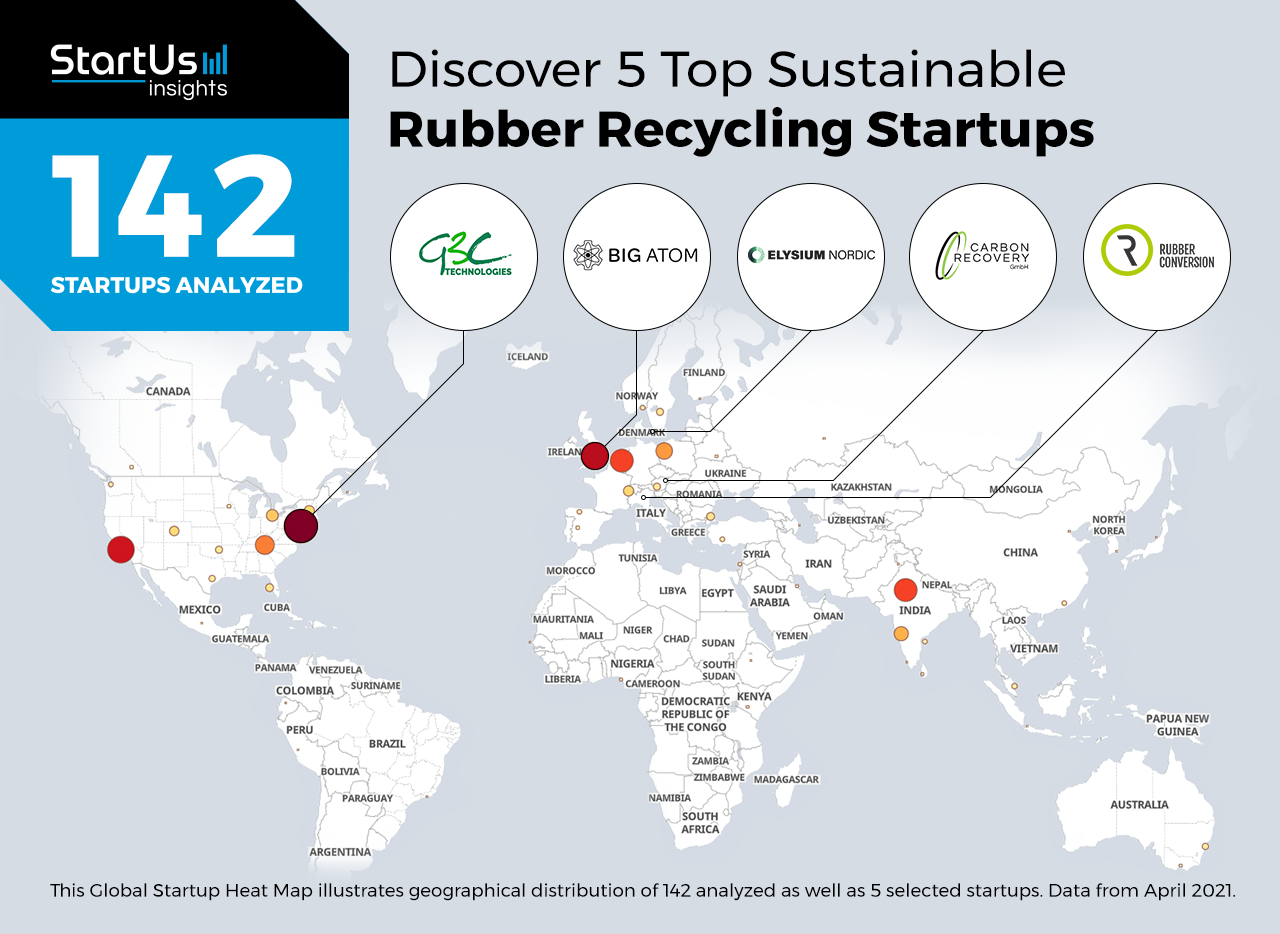Staying ahead of the technology curve means strengthening your competitive advantage. That is why we give you data-driven innovation insights into the Circular Economy. This time, you get to discover 5 hand-picked startups developing sustainable rubber recycling solutions.
Global Startup Heat Map highlights 5 Top Rubber Recycling Startups out of 142
The insights of this data-driven analysis are derived from the Big Data & Artificial Intelligence-powered StartUs Insights Discovery Platform, covering 1.379.000+ startups & scaleups globally. The platform gives you an exhaustive overview of emerging technologies & relevant startups within a specific field in just a few clicks.
The Global Startup Heat Map below reveals the distribution of the 142 exemplary startups & scaleups we analyzed for this research. Further, it highlights 5 startups that we hand-picked based on criteria such as founding year, location, funding raised, and more. You get to explore the solutions of these 5 startups & scaleups in this report. For insights on the other 137 rubber recycling solutions, get in touch.
Rubber Conversion develops Devulcanization Technology
Successful rubber vulcanization technologies lead to the proliferation of tires and other rubber- and elastomer-based products. However, cities and industries grapple with the piles of used rubber, such as from end-of-life tires (ELTs). Due to its incredibly high resistance to degradation, recycling rubber requires innovative solutions that speed up the process. Startups are exploring suitable devulcanization solutions that break down rubber into other useful products, such as oil and fuel.
Rubber Conversion is an Italian startup utilizing a devulcanization technology to recycle post-production and post-consumption rubber waste into useful products. The startup’s SRC product family comprises natural rubber, as well as styrene-butadiene rubber (SBR), compounds that find application in different industries. Rubber Conversion also offers Tool-Devulcanization to enable the reuse of product offcuts as raw active ingredients for the active compounds. This helps companies build and maintain a circular economy for rubber.
Carbon Recovery enables Low-Temperature Vacuum Pyrolysis
Pyrolysis of scrap tires in a vacuum allows rubber materials to disintegrate in a controlled manner. In turn, this process converts the broken-down particles into new chemistries to form useful products, for example, through carbonization. Vacuum pyrolysis is useful for breaking down organic matter in particular since the energy requirements significantly reduce in this method. Startups employ vacuum pyrolysis to convert rubber into sustainable products for reuse in different industries.
Austrian startup Carbon Recovery achieves low-temperature vacuum pyrolysis by eliminating oxygen from the process. This allows scrap tires to easily degrade at higher temperatures, resulting in gaseous carbon compounds and solids that are later converted into oil by condensation. The solids are separated as recovered carbon black (rCB), a high-quality raw material. Carbon Recovery is also a sustainable business by using its waste gas to power its operations. The solution is an alternative to producing industrial carbon black, which typically consumes a high amount of resources and produces waste.
G3C Technologies offers Next-Generation Scrap Tire Conversion Technology
Carbon black is found in numerous commonly used materials and products around us. From shoe soles, dry batteries, tires, and inks, carbon black is in continuous demand. However, conventional production of carbon black involves burning oil or gas to high temperatures. By recycling rubber, such as tires and other elastomer products, startups develop novel and sustainable methods to produce carbon black. Such solutions enable a circular economy for rubber products and reduce the use of fossil fuels that produce carbon black.
US-based startup G3C Technologies (read as ‘triple green conversion’ technologies) implements scrap tire conversion technologies that potentially produce any grade of carbon black. The startup aims to eventually replace the use of fossil feedstock materials for a large part of carbon black production. Additionally, the technology significantly reduces carbon dioxide emission arising from carbon black production. The carbon black produced by the startup is suitable for manufacturing various rubber and plastic products. In addition to carbon black, the technology also produces energy for internal needs and external sales.
BIG ATOM unlocks Chemical Regeneration for Rubber
Reducing the energy consumption for waste rubber material recycling is increasingly a priority for industrial companies. Traditional thermal regeneration techniques leave a substantial carbon footprint, making it difficult to justify the recycling process over time. To address this challenge, startups develop chemical regeneration technologies that use lesser energy resources, as well as reduce costs involved in recycling. Moreover, chemical regeneration allows tire recyclers to control the final quality of the recycled product.
BIG ATOM is a British startup employing a patent-pending reactor technology to significantly improve product yields and energy efficiency. BIG ATOM’s mechanical processing plant separates the tires into rubber and steel products. Later, their chemical regeneration technology turns rubber into petrochemicals, ready for new polymer manufacturing. In this way, the startup creates a pathway to green polymer materials that do not generate waste. This lowers the costs of waste disposal for the consumer and enables the effective processing of more waste streams.
Elysium Nordic employs Advanced Microwave Technology
In comparison to conventional thermal decomposition, microwave-based heating offers several benefits. Selective and rapid distribution of heat, enhanced chemical reactivity, and process flexibility are some of the advantages of microwave technology. When used for recycling rubber materials, microwave technology reduces energy use and overall costs of recycling. Startups deploy this technology to efficiently convert ELTs back into useful products for the industry.
Elysium Nordic is a Danish startup utilizing a patented microwave technology to recover gas, steel, oil, and carbon black from ELT materials via thermal decomposition. The startup’s first plant will be built in the port of Nyborg in Denmark with the capacity to recover up to 12.000 tons of carbon black from 30.000 tons of ELT. The plant will also use recovered gas in its own processes, reducing the need for external sources of energy, as well as delivering surplus heat to the district heating network.
Discover more Sustainable Manufacturing Startups
Startups such as the examples highlighted in this report focus on additive manufacturing, developing new materials, coatings as well as automation. While all of these technologies play a major role in advancing the manufacturing industry and Circular Economy, they only represent the tip of the iceberg. To explore more technologies, simply get in touch to let us look into your areas of interest. For a more general overview, you can download our free Industry Innovation Reports to save your time and improve strategic decision-making.









